Tim DeRoche featured the tale of an Arizona boy named Brayden in a Time Magazine piece on the shortcomings of open enrollment practice and law for students with disabilities:
"In May 2022, an Arizona mom named Karrie got a heartbreaking message from the local public school: Her son Brayden wouldn’t be allowed to return as a second-grader in the fall. The reason? Brayden had been diagnosed on the autism spectrum, and the school claimed that it didn’t have any more room for kids with disabilities."
Brayden’s family had moved outside the Tanque Verde district attendance boundary but had remained enrolled through the open enrollment statute. After Tanque Verde Unified officials went through the process of drawing up an Individual Education Plan with Brayden’s family, however, other Tanque Verde officials kicked him to the curb. They were able to do so because of a canard promoted by Arizona districts known as “program capacity.” The claim essentially is that while the district may have empty seats, it lacks “program capacity” to serve students with disabilities. Arizona districts thus prevent students with disabilities from participating in the state’s largest form of K-12 choice.
Time out! Important nerdy context: Arizona funds the education for students with disabilities by a weighted formula that is imperfect but goes up to ~x6 basic state aid. Charter schools are required to admit students by lottery; districts have a more recent lottery requirement that has a de facto “program capacity” loophole not allowed by the Arizona State Board for Charter Schools (equal protection challenge anyone?) Students with disabilities are overrepresented in Arizona’s ESA program, and there is, in addition, a scholarship tax credit program exclusively for students with disabilities. While districts claim to have “programs,” their SWD populations vary from year to year, as does their staffing.
Okay, time back in! Recently, Ben Scafadi performed an analysis of open enrollment in Kansas. In Kansas, as is generally the case, districts decide their capacity to accept open enrollment students. Scafadi decided to compare the number of seats made available through open enrollment to the overall enrollment trend in those same districts since 2019. Scafadi called this the “Change-in-Enrollment Method” to identify open enrollment capacity. Obviously, districts occasionally close schools, etc., but for the most part, the logic is unavoidable: if you were educating X number of students in 2019, there is every reason to view that as a floor for enrollment in 2024, absent unusual circumstances. Scafadi found discrepancies: 
Naturally, when I saw the Scafadi study, I thought, “Why not apply the ‘Change-in-Enrollment Method’ to Arizona School Districts for students with disabilities?” I filled a hat with the names of Arizona school districts, and purely by chance drew Tanque Verde Unified out of the hat. In 2019, the National Center on Education Statistics put the enrollment for students with disabilities for the Tanque Verde Unified School District at 286. The Arizona Department of Education put the 2025 enrollment for students with disabilities at 206. Thus, the special education “program” at Tanque Verde Unified shrank by 28% between 2019 and 2024, in small part because they purged Brayden.
The basic logic of the Scafadi change in enrollment method applies: if Tanque Verde’s special education “program” was 29% larger in 2019 than in 2025, why was there a need to disenroll Brayden? Moreover, an examination of school district enrollment trends for students with disabilities in Arizona districts generally show more districts losing enrollment for students with disabilities than those gaining.
Tanque Verde Unified is not alone. Collectively, the 10 Arizona school districts with the largest enrollment of students with disabilities in 2019 lost 1,786 students with disabilities since 2019, but there is approximately a 0% chance of a student with a disability accessing any of these districts through open enrollment. Two paths can be pursued to end the discrimination against students with disabilities in open enrollment. First, an enterprising attorney could explore whether the Arizona court system is willing to uphold the “Equal Privileges and Immunities” clause in the Arizona Constitution. Second, lawmakers could pass legislation defining district “program capacity” for students with disabilities as having an enrollment floor not less than their enrollment with students with disabilities at a past date (2010 is a nice even number) and require the districts to make spots available until reaching that enrollment figure.
“Brayden’s Law” has a nice ring to it.
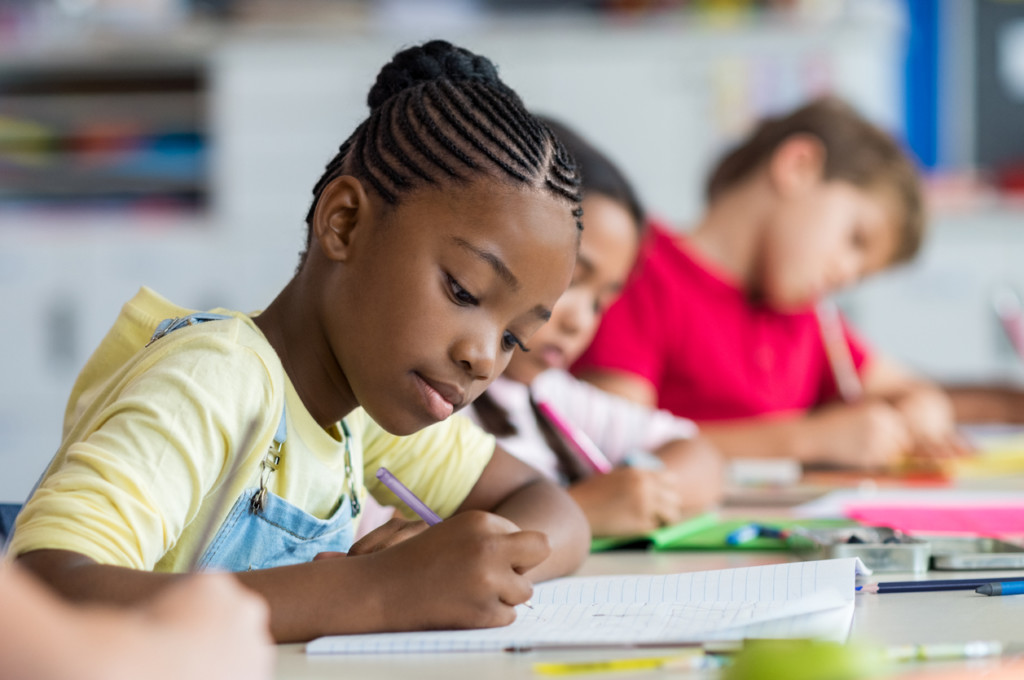
Recently I reported that Florida’s students with disabilities exceeded multiple states statewide averages for all students on multiple 2022 NAEP exams. This is both encouraging (for Florida) and disturbing for much of the rest of the country. But wait the news gets better (worse) still.
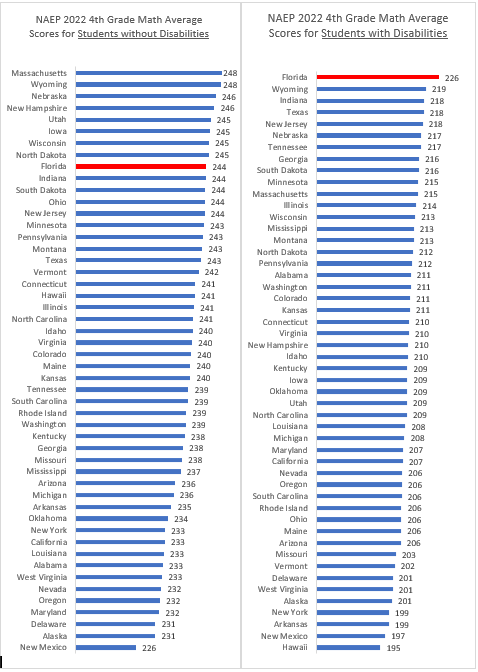
Above are charts showing NAEP fourth grade math scores for both students without disabilities (on the left) and those students with disabilities (on the right). Nationwide the average achievement gap between students without disabilities and students with disabilities was 38 points, and the gap varies between states.
Notice that Florida, marked in red, ranked first for students with disabilities and ninth for students without disabilities. Now look a bit closer. See it yet? Let me help you out:
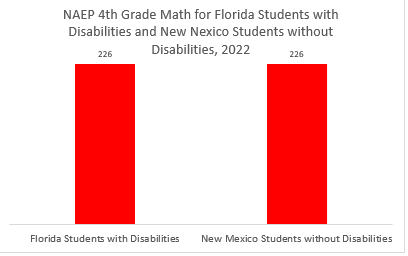
I’ll leave it to you dear reader as to whether you prefer to marvel at the improvement in outcomes for students with disabilities in Florida, lament the outcomes in New Mexico, or both. Put me down for “both” please. Just in case you are tempted to write this off to some kind of COVID-era fluke, it actually happened before in 2005 and very close to happening in 2009, long before the pandemic.
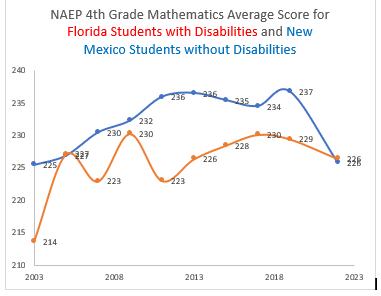
As noted earlier, Florida provides a relatively large amount of choice to both students with disabilities and students generally. Florida has also spent decades of effort in promoting sound reading instruction for all students. New Mexico’s public education system seems much more focused on generating adult salaries and pensions.
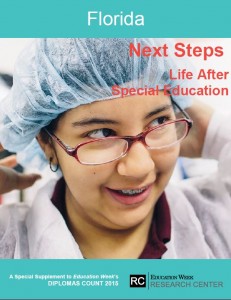 The latest report on Florida’s public school graduation rate tells a familiar but underreported story: The rate continues to be both among the nation’s worst – and its fastest improving.
The latest report on Florida’s public school graduation rate tells a familiar but underreported story: The rate continues to be both among the nation’s worst – and its fastest improving.
Florida’s graduation rate in 2013 was 76 percent, putting it 5 percentage points below the national average and No. 43 among 49 states with data to report, according to the most recent federal stats spotlighted via the annual Diplomas Count report from Education Week, released today.
Iowa came in at No. 1, with 90 percent. Oregon was last at 69 percent. Data wasn’t available for Idaho.
At the same time, Florida’s graduation rate rose 5 percentage points between 2011 and 2013. That’s more than twice the national rate and tied for 5th among states in gains. (Nevada led in progress, with a 9-point jump.)
Until last year, Education Week used its own methodology to determine state-by-state graduation rates, rather than rely solely on federal data. In 2013, it reported Florida’s rate ranked No. 2 in improvement between 2000 and 2010, rising 23 percentage points over that span. (That report also ranked Florida No. 34 among states in 2010.)
Graduation rates are dicey to compare state to state because of differences in demographics, graduation requirements and diploma types. Florida is among the poorest of states (it ranks No. 44 in the percentage of students eligible for free- and reduced-price lunch) but has set a higher bar than most for earning a standard diploma (see here and here).
The latest Diplomas Count puts special emphasis on students with disabilities. (more…)
The Florida Senate has proposed taking a new path on legislation that would create individual accounts for special-needs students.
Under a rewrite approved this morning by the Education Appropriations panel, the legislation would create "enhancements" of the existing services for children with disabilities.
Earlier versions of the bill would have created education savings accounts based on the state's core per-pupil education funding. The new proposal would create a Florida Personal Learning Scholarship Accounts program, overseen by the Agency for Persons with Disabilities and paid for by $18.4 million in separate funding.
The program would be open to students with conditions like autism and cerebral palsy who participate in home-education programs, or attend public or private schools.
Like the original proposal, it would give their parents a way to pay for additional instructional materials, private school tuition, or certain kinds of therapy. They could also use the money to save for college or pay for services provided by school districts.
"To me it's very simple. It's about more money to kids who need it the most," said Senate Education Chairman John Legg, R-Trinity, who noted some of the bill's initial opponents were concerned about funding the accounts in the state's education budget. "This is additional money for additional services for all kids."
"What it begins to recognize is that our public schools cannot be health-care providers for everyone," he added.
Advocates for students with disabilities, including Robyn Rennick of the Coalition of McKay Scholarship Schools, spoke in favor of the bill. Representatives for the statewide teachers union, which opposed the original legislation, withdrew their opposition after the changes were approved. (more…)
In a new twist on the legislative funding changes crimping Florida Virtual School, private schools that accept state-funded McKay Scholarships for special needs students may now lose money when McKay students take FLVS classes.
Private schools learned last week about the possible fallout, which could result in students dropping Florida Virtual School courses or parents paying for what traditionally has been offered for free.
Many of the 1,200 private schools that accept the scholarships, which on average range between $3,977 and $7,019, don’t charge parents more for tuition, said Robyn Rennick of The Coalition of McKay Scholarship Schools. So they likely will withdraw students from FLVS courses or ask parents to make up the difference.
“Was this really what the Legislature intended when they changed this statute – hurting the parents of kids with disabilities?’’ the coalition asked in a notice to school operators Monday.
Of the roughly 27,000 students who receive McKay Scholarships, 790 are enrolled in FLVS classes. At many of the high schools that accept the scholarships, students are taking driver’s education and health courses offered by FLVS, Rennick said.
FLVS officials, who have watched enrollment plummet since the funding change, said they’ve already heard from private school administrators who say the proposed cuts will cause financial hardships and lead to withdrawal of students currently enrolled in FLVS.
“This is yet another unintended consequence of the new funding model – denied choice for children with disabilities working hard to get the best education they can possibly get,’’ Florida Virtual School spokeswoman Tania Clow said.
Department of Education officials plan to discuss the issue Friday morning during a regularly scheduled internal meeting. They declined comment Thursday. (more…)
Charter schools. What happened to the Ben Gamla charter school in Pinellas is a "study in bad charter school governance." Choice Words. Parents try to figure out what to do now that a struggling charter school in Deland is closing. Daytona Beach News Journal. Ditto for the parents of a charter school in Lutz. Tampa Tribune. After 22 years in traditional public schools, a local principal is hired to lead the city of Cape Coral charter school system. Fort Myers News Press.
 Homeschooling. The Palm Beach Post takes a look at Space of Mind, a pricey but fascinating home-school school that insists it's not a school.
Homeschooling. The Palm Beach Post takes a look at Space of Mind, a pricey but fascinating home-school school that insists it's not a school.
Tax credit scholarships. The number of parents seeking them grows in Highlands and beyond. Highlands Today.
School grades. Education Commissioner Tony Bennett is recommending another year of a "safety net" provision so grades don't drop more than one letter grade. Tampa Bay Times, Miami Herald, Palm Beach Post, Orlando Sentinel, Florida Times Union, Tampa Tribune, TCPalm.com, Associated Press. Other states are watching the goings-on. Miami Herald. Another story on how everyone is expecting grades to drop. Sarasota Herald Tribune.
VPK. Needs to be more focus on pre-K for poor kids. Pensacola News Journal.
Common Core. The Tallahassee Democrat offers an overview of the big challenges and potential payoffs ahead. (more…)
Charter schools. A Palm Beach County School Board member questions whether it's appropriate to allow a charter school to stay in a district building that needs millions of dollars in renovations. Extra Credit.
 Career education. Manatee students make a splash in two national competitions - one in technology, and the other for career and technical students. Bradenton Herald.
Career education. Manatee students make a splash in two national competitions - one in technology, and the other for career and technical students. Bradenton Herald.
Rick Scott. A new web ad from the Republican Party of Florida highlights teachers who praise Rick Scott. StateImpact Florida, Gradebook.
School zoning. Alachua is looking for better ways to communicate with parents about exceptions that allow students to attend schools other than their zoned schools. Gainesville Sun.
School schedules. South Florida Sun Sentinel: "High school schedules in Broward County won't change next year despite an arbitrator's ruling this week that seven-period schedules violated a contract with the teacher's union." More from the Miami Herald.
School spending. Polk's athletic budget has been cut 22 percent since 2007. Lakeland Ledger.
School food. Districts respond to a federal crackdown on yummy stuff. Sarasota Herald Tribune. (more…)
Parent power. Gov. Rick Scott signs into law a bill that gives parents of disabled students more say over their kid's education. Orlando Sentinel, Associated Press.
 Virtual schools. Scott also signs the digital learning bill into law. Florida Current.
Virtual schools. Scott also signs the digital learning bill into law. Florida Current.
Charter schools. The Lakeland-based Achievement Academy, a charter for students with disabilities, plans to double enrollment to meet demand. Lakeland Ledger.
Career academies. A new firefighters academy is opening at Wellington High School next fall. Palm Beach Post.
Schools and religion. Atheist materials censored by the Orange County School District contained criticisms of the Bible. Orlando Sentinel.
School grades. The state again considers revision to the system in the face of concerns that the results will be too harsh. Tampa Bay Times. Add Treasure Coast districts to those warning parents about a drop in grades. TCPalm.com. A new task force should retract the most "onerous" changes to the grading system. Miami Herald. Or "trash" the system altogether. Palm Beach Post.
School technology. New technology in the Miami-Dade district is boosting education for students with disabilities. Miami Herald.
School spending. The state approves Manatee's financial recovery plan. Bradenton Herald. Bay plans to remove 22 old portables this summer. Panama City News Herald.
School districts. Pinellas needs to be more transparent with public records. Tampa Bay Times. (more…)
by Allison Hertog
I have dedicated my life to helping disabled students – first as a special education teacher and, for the last many years, as an attorney for parents of disabled children. As strongly as I support the rights of disabled students to be educated on an equal playing field with their typical peers, I do not completely agree with the kind of heavy governmental oversight of private schools that the U.S. Department of Justice mandated last month in its much-publicized letter to the Wisconsin superintendent of public schools.
In that letter, the DOJ finds the State of Wisconsin is obligated to “eliminate discrimination” against students with disabilities in its private school voucher program, regardless of whether the private schools accept federal funds.
Because they take federal funds, states are of course charged with meeting certain federal civil rights mandates in their administration of public schools. I am not an expert in school choice law, or the Americans with Disabilities Act for that matter. But what appears to be new here is that because Wisconsin administers a school choice program, it must “ensure” that participating private schools, regardless of whether they take federal funds, adhere to some of the most important mandates of the ADA.
The private and religious status of the individual voucher schools does not absolve DPI of its obligation to assure that Wisconsin’s school choice programs do not discriminate against persons with disabilities as required under Title II [of the Americans with Disabilities Act.]
The letter was precipitated by a complaint filed in June 2011 by the American Civil Liberties Union and Disability Rights Wisconsin. It alleged the Milwaukee voucher program discriminates against kids with disabilities and segregates them in public schools. It claimed that of the 21,000 students enrolled in private voucher schools, 1.6 percent had plans that specified special needs services, compared to about 20 percent of students in the Milwaukee public school system. Voucher advocates such as Patrick Wolf, who completed a study in 2012, have found less discrepant rates of disability in the Milwaukee program.
An important note: Wisconsin’s voucher programs are not designed specifically to serve children with special needs, such as Florida’s John M. McKay Scholarship for Students with Disabilities. They are designed to serve all students with family incomes up to 300 percent above the poverty level.
Nonetheless, the result of the DOJ letter is the state must seriously ramp up its oversight of the private secular and religious schools participating in its voucher programs, including the Milwaukee Parental Choice Program, the oldest voucher program in the country.
Some oversight is, of course, warranted. In our country, private schools can’t discriminate against students based on their race for instance, regardless of whether the schools take government funds. And private schools which don’t take federal funds shouldn’t discriminate in their admissions and suspensions process against students who can meet the demands of the school if provided with reasonable accommodations and supports.
However, not all private entities in our society have a public purpose. Some private schools choose to forego the benefits of federal monies because they want to provide a certain type of education to a certain type of student population - be it a nunnery or a secular feeder high school to the Ivies. In the later case, even a private school which takes federal funds is totally within the confines of the ADA to discriminate against a child applicant with intellectual disabilities who cannot meet its academic demands. When a private school foregoes government money, it should not be subject to the same government oversight as a school which reaps the benefits of it. (more…)
Virtual schools. Florida Virtual School is battling proposed budget cuts, reports Associated Press. A state investigation finds online provider K12 Inc. employed three teachers who lacked proper certification to teach some subjects, reports StateImpact Florida.
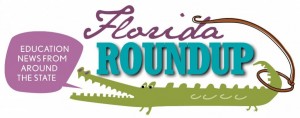 Magnet schools. A Hillsborough high school best known for its football program starts an academic program heavy on dual enrollment. Tampa Bay Times.
Magnet schools. A Hillsborough high school best known for its football program starts an academic program heavy on dual enrollment. Tampa Bay Times.
Charter schools. Neighbors are upset about plans for a 2,000-student Academica charter school in East Kendall. Miami Herald.
District charter schools. The Polk district's Step Up Academies for struggling students (no connection to Step Up For Students, which co-hosts this blog) are being asked by district officials to be even more like schools within schools. Lakeland Ledger.
Common Core. Protesters at the Capitol, reports StateImpact Florida. Tony Bennett's thoughts on PARCC, also from StateImpact Florida. (more…)